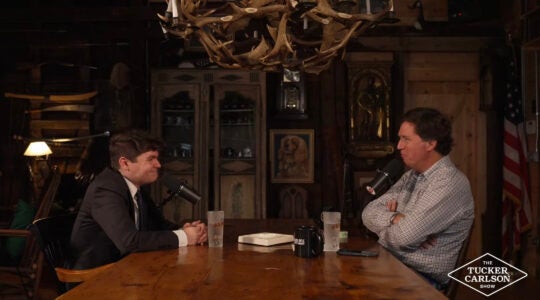NEW YORK (JTA) — Add acclaimed director Quentin Tarantino to the long list of filmmakers who can’t resist making their own World War II fantasy-action flick.
Tarantino’s latest release is "Inglourious Basterds" – and yes, the misspelling is intentional.
Inspired by a schlocky 1970s Italian "macaroni combat" action picture of the same name, the movie is Tarantino’s homage to the "misfits on a mission" movies of old, like "The Dirty Dozen."
His heroes are a Jewish-American revenge squad wreaking havoc throughout German-occupied France who not only kill but scalp their Nazi targets.
In a parallel storyline, a beautiful young Jewish woman whose family was slaughtered by the SS somehow takes over the Paris cinema where Goebbel’s latest propaganda film will debut, with Hitler in attendance. She plans to trap the audience of high-ranking Nazis inside and burn the building to the ground.
"My name is Shoshanna Dreyfus," she announces, "and this is the face of Jewish vengeance."
At the news conference following the film’s debut, one journalist asks if "Inglourious Basterds" is a "Jewish revenge fantasy."
Eli Roth, one of Tarantino’s "basterds" and also director of the "Hostel" horror movies, said the notion of Jews getting even with Hitler was "kosher porn."
"It’s something I dreamed since I was a kid," Roth said.
In the movie, Roth gets to live out his childhood fantasy: He plays the baseball bat-swinging "Bear Jew," who some of the film’s Nazis believe is really a vengeful golem.
The concept of the film challenges the stereotype of wimpy Jewish males on the big screen personified by Woody Allen back in the 1960s. It’s a stock character that still makes appearances, notably in the film comedies of Ben Stiller and TV shows like "Curb Your Enthusiasm."
I for one am tired of it. In a world in which Jews are under constant threat, is "wimpy" really the image we want to convey?
The 21st century iteration retains traces of nebbishness, but also displays an edgy attitude reminiscent of the scruffy, hyper, cocky Jewish characters Richard Dreyfus specialized in during the 1970s.
Seth Rogan, Paul Rudd and Jonah Hill are three of the stars in Jewish director Judd Apatow’s constellation who seem to be channeling Dreyfus’ satirical outlook and boundless energy in Apatow films such as "The 40 Year Old Virgin," "Knocked Up" and "Superbad."
"The Hebrew Hammer" (2003), starring Adam Goldberg, paved the way for a new kind of swaggering Jewish hero on film. He’s sexy because he’s Jewish, not in spite of it.
The movie plays with African-American and Jewish cultural touchstones: The Hammer drives a pimped-out white Cadillac with Magen David headlights; his license plate reads "L’Chaim"; and his fuzzy dice are dreidels.
After saving some Jewish children from older Christian bullies, he tells them solemnly, "Stay Jewish." The result is the first "Jewsploitation" film.
More swaggering Hebrew heroes turned up in other comedies like "Hot Rod" (2007), in which Andy Samberg stars as an Evel Knievel-inspired stuntman — not exactly a profession commonly chosen by Jews.
Meanwhile, Adam Sandler starred in "You Don’t Mess With the Zohan" (2008), about a former Mossad agent who dreams of becoming a hairdresser.
Jews with attitude aren’t restricted to comedies, but they aren’t seen very often in dramas, either, except in movies such as "Raid on Entebbe," made back in 1977.
Recently, however, the character of the armed, defiant Jew has reappeared. Edward Zwick’s "Defiance," for example, is about four Jewish brothers from Poland who escape the Nazis and go on to rescue fellow Jews. (As an English Jew, I have to admit I got considerable nachas seeing Daniel Craig — James Bond himself — kicking Nazi tuchas alongside Liev Schreiber.)
And now "Inglourious Basterds" is set to hit the big screens on Aug. 21, and the unabashedly Jewish characters are a major selling and plot point. The movie is sure to inspire a tingle of "what if" wish fulfillment in audiences, Jewish and non-Jewish.
Simcha Weinstein is an award-winning author whose latest book is "Shtick Shift: Jewish Humor in the 21st century" (Barricade Books, 2008).
JTA has documented Jewish history in real-time for over a century. Keep our journalism strong by joining us in supporting independent, award-winning reporting.





